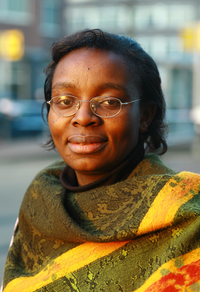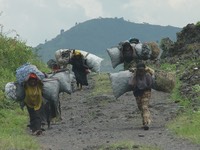28 November 2019
Lingering trials, poor monitoring
Iyamuremye's visit is allowed to stay for only 15 minutes, Mugimba's health insurance is not renewed so he is without medication for days. ICJ (International Commission of Jurists) monitoring reports come in fits and starts and are nothing more than a record of hearings and interviews. Promised analyses are not forthcoming.
Three years after their extradition in November 2016, the trials of Jean Claude Iyamuremye and Jean Baptiste Mugimba in Rwanda are still dragging on at a snail's pace.
To get an idea: on 8 July this year, Iyamuremye's defence team asked for a video conference to be organised to hear three witnesses who live in Brussels. As it is the first time that something like this happens during an extradition, the judges ask for time to think about it and postpone the hearing to 25 July. At the hearing, it becomes clear that the judges need more information, so they simply adjourn to 25 September. By then, the judges have made a decision: the videoconference can be held, the Ministry of Justice will pay and the witnesses can be protected given the political climate in Brussels (!). The hearing is then adjourned to 5 November. So the decision on the videoconference has taken about five months altogether.
Mugimba's last report was for the month of July. That is almost six months ago! They did receive a visit from the Dutch embassy this summer. They promised to visit twice a year. With such an appointment, it does not seem likely that the Netherlands will release them soon.
Because the monitor reports are taking months to arrive, the question is whether the Netherlands can properly check what is happening in Rwanda. After all, the Ministry of Justice says it is monitoring what is happening based on these reports.
In the spring of 2018, ICJ was called to account by the Netherlands about the irregular appearance of the reports and the lack of analyses. ICJ promised improvement; a single meaningless analysis appeared and then it became silent. Asked about the analyses at our Ministry of Justice, it also remains silent. I assume that they do not have them either.
In a Parliamentary Letter dated 27 March 2019, the Minister of Justice writes that 'In 2019, further detail will be given to the cooperation, which will also look at the form and nature of the analyses to be provided by ICJ.'
Enquiries with the Ministry reveal that little further detail has been provided: 'This process is still ongoing. It is now the end of November. The chance that something will be 'fleshed out' in December seems small to me.
Monitoring of Iyamuremye and Mugimba of doubtful quality
No (public) analyses, no recommendations, selective reports. It is not going well with the monitoring of Jean Claude Iyamuremye and Jean Baptiste Mugimba. They are not satisfied and fear that the International Commission of Jurists, the monitoring organisation, is in league with the Rwandan government.
They also do not receive all the public monitoring reports; there are now about 14. They were particularly critical of the selective reporting of what happens in their cases. That way, no good picture of reality can be obtained.
What the reports also fail to mention is the follow-up to previous complaints. Therefore, we do not know how things stand with the transports to the hospital, with the inadequate note-taker, with the lack of sound equipment, with the medical care in the prison. The ICJ does not even officially report which prison they are in.
Both trials are dragging on, although there are some successes. For example, Iyamuremye's lawyers received financial compensation to hear witnesses in Brussels and Rwanda. And one witness in the Mugimba case told us that he was pressurised by the prosecutors. They gave him a written statement against Mugimba, which he had to sign. If he did not, he would be killed, he said at the hearing in January 2019. There are now numerous examples of pressurising witnesses to give false testimonies.
Conditions in prison are reasonable, although there is the fear that Rwanda is looking into the laptops they have. They use the laptops for their defence. Because the guards thought they were using the Internet (prohibited), their laptops were examined. This made the prisoners suspicious: was spyware installed? Eventually they were given new laptops, but these were also taken away soon after they were issued: new software had to be installed. The suspicion remained.
The cell blocks are regularly searched. At the beginning of December 2018, Iyamuremye's guards find RwF 24,000 (about €24) in a book. He has to go to the isolation cell. His brother, who has come over from Ireland for a Christmas visit, is refused. After long insistence, he is allowed to visit Iyamuremye for 15 minutes, in the presence of the prison director.
Monday, 13 August 2018
Quality of monitoring in Rwanda leaves much to be desired
A judge ruled that Jean Claude Iyamuremye and Jean Baptiste Mugimba could be extradited to Rwanda, as long as their trial was monitored. The Netherlands asked ICJ (International Commission of Jurists) for a quote and after some negotiating, they got the job. ICJ would regularly report on the quality of their trial and the situation in the Rwandan prison.
After the extradition, autumn 2016, the reports came in fits and starts; on one occasion even six at a time! Also, the reports were only a record of events and meetings with Iyamuremye, Mugimba, their lawyers, the Dutch embassy, prison representatives. Not a single analysis or conclusion - although promised in the tender - could be found in the reports. (See also the contribution of January below).
This was too much for the Ministry of Justice. The Dutch embassy called the organisation to account: there had to be regular reports with an analysis. ICJ promised to do this.
The first analysis was given in May about the period March-early April. The one on Mugimba's case is 4 lines long and not very significant. The analysis on Iyamuremye is more extensive and is not particularly encouraging. The judges constantly interrupt the lawyers, are biased, not interested. Of particular concern is the observation that the judges do not always interpret the laws correctly. ICJ recommends training!
ICJ: Unreliable and Not Transparent
My own experiences with ICJ are bad. In preparation for my trip to Nairobi in April, I tried to make an appointment with them from the Netherlands. Nairobi is where the office monitoring Iyamuremye and Mugimba is located. There was no response to e-mails and I was sent from pillar to post by telephone. Don't worry, I thought, I know how it works, when I'm in Nairobi I'll just drop by. I'll be there for four weeks, so I should be able to do that.
One of the first days, I happily dropped by: the office is located, together with other offices, in a beautiful garden. A friendly young man received me. He would see what he could do for me, one of the monitors was there. In the end, I did not get to speak to the monitor. He would call me for an appointment.
So after a two days wait, I called him myself. An appointment was made. Well, that went reasonably smoothly I thought and I wrote my questions for them in my notebook. How does the monitoring work exactly? Are there fixed monitors or are there different ones every time? Do they discuss the reports with Iyamuremye and Mugimba? And why do the reports come so irregularly and why do they have no analysis? Those were about the most important ones.
I reported at the appointed hour; the friendly young man said softly - after I had been watching the comings and goings around the tiny reception desk for an hour (painting nails, making phone calls, giggling with colleagues) - that the monitor was not there. He would ask the monitor to call me for a new appointment.
Ten days before my departure to Holland, I still hadn't heard from them, so I e-mailed the friendly young man again: "It seems you don't want an appointment with me." He reacted as if stung by a wasp and gave me the e-mail address of a lady from communications. Then things suddenly moved fast, the next day I was allowed to come by; I think it was to explain what I wanted to do with the interview, but in the room was the director and a communication guy. I was allowed to talk to them, not to the monitors.
Lying straight to my face
After the introduction round, I was told a condition: I had to ask all my questions at once, and they would then answer them one by one. I refused. That's no way to conduct an interview. Then the atmosphere, which was not very cheerful when we entered the room, became extremely hostile. I kept refusing, they refused another set-up. There was nothing to do but to give in. Then I would at least get some information.
In the end, the interview lasted less than half an hour and the director, Samwel Mohochi, turned out to be some guy. He told me that the analyses and conclusions were sent separately to our Ministry of Justice. That they were not public and it was therefore down to our Ministry. ICJ sent the reports regularly; it was our Ministry that kept the reports. Well, all that can be checked and so I mailed the Ministry if they had analyses and if it was true that they published irregularly? Almost immediately, I received an e-mail back. No, no separate analyses had been received and no, it was ICJ who sent the reports irregularly. The director of ICJ had lied to my face.
ICJ attacks its own client
It is remarkable, to say the least, that the ICJ's director should discredit his own client in this way. All in all, the organisation does not come across as reliable and transparent. When I confronted the director with the answers from our ministry, he threatened to take legal action. 'We kindly wish to remind you that any misinformed conclusions arrived at by yourself that brings our institution to any disrepute shall attract immediate legal intervention to safeguard our interests.'
It is now 13 August. The last reports date from May 15. So there should be 2 more reports now, but I have not been able to find them on the site.
Wednesday, 31 January 2018
Probably in February, or March, or May
When are the new monitor reports by Jean Claude Iyamuremye and Jean Baptise Mugimba due? It seems like a not too complicated question. Yet the ministry's answer took more than two weeks to arrive and was also deliciously vague: 'The new monitor reports (through November 2017) are expected to be published in February.' Expected in February. So it could very well be March or April.
However, we need not worry that Iyamuremye and Mugimba are being treated badly or have an unfair trial: 'Because if there really is something going on, we will definitely hear from the ICJ'.
I decided to contact the International Commission of Jurists (ICJ) to find out from them whether they would indeed call if something were wrong. The ICJ is a respected organisation and has been for some fifty years. It has its headquarters in Switzerland, but the head of communications there, I discovered, has no idea what goes on in their Kenyan office. We hardly have any contact', said Olivier van Bogaert. He gave me a phone number of the Kenyan office, but could not give a name. I don't know them'.
For three days, I tried to get in touch with the ICJ Kenya. The first time, the person in charge was not there. The next day, the phone was hung up twice and the third time, I was connected to someone who said that the head of communications was not there. He would call me back. I gave my number and sent another email the next day with my number and you guessed it ... so far I have received no sign of life from the ICJ. In any case, this has not increased my confidence in the monitoring by the ICJ.
Their reports are flat, records of conversations, without any conclusion or analysis, although that was promised. The fact that it takes more than half a year for new reports to appear also gives pause for thought. The fact that it is not even certain when the new reports will appear is even more puzzling.
According to the Ministry, we have nothing to worry about. If there really is something wrong, the ICJ will be on the phone. They regularly visit Iyamuremye and Mugimba. How often that is, I was not told. All visits are in the reports. Hello Ministry, that is not an answer, because there are no reports yet. That's exactly what I'm whining about.
How much does monitoring cost so far? I didn't get an answer to that question either. The final financial result for 2017 will probably be published in the first quarter. Unless it is included in the general annual report of JenV (Ministry of Justice and Security), which always goes to the House in May', according to the ministry spokesperson. Again that wonderful word 'probably'. So March, or May. Probably.
To be continued, probably.
Thursday, January 18, 2018
Will the Netherlands abandon the two extradited Rwandans?
The judge could not have put it more clearly in his judgment of 5 July 2016:
'The Court considers it of great importance that the case of Iyamuremye and Mugimba will be monitored by the ICJ (International Commission of Jurists) for the benefit of the state so that the Rwandan authorities will take into account that any violations of a fair trial will become known.'"
And so the ICJ was commissioned by the Ministry of Justice and Security (then called Security and Justice) to monitor the trials of Jean Claude Iyamuremye and Jean Baptiste Mugimba for about 170,000 euros. From their arrival in Kigali on 12 November 2016 until now, four reports have appeared. The latest report covers the months of May, June and July 2017. This means that no report has been issued for the past six months.
I emailed the Ministry of Justice and Security asking if that was indeed true. The spokesperson replied that I would get an answer the same day or the day after. That seemed fine to me; after all, a phone call to the ICJ in Nairobi doesn't have to take long. An e-mail does not need weeks either. So that was on 15 January and I still don't have an answer.
The process of a report turns out to be long. For example, 25 August is the date of the last report for May, June and July 2017. But it is only on 20 October that the reports are published on the Rijksoverheid.nl site. So it takes two months to put the reports on the internet.
The fact that no reports have been published for the past six months is worrying. Because both processes started in the month of September. I do not know what the charges are exactly. I do know that Iyamuremye first had six charges and now only one. Mugimba too started with six charges; he now has four.
There is no contract between the Ministry and the ICJ. There was a proposal from the ICJ that was promoted by the Ministry to an 'agreed and established agreement'. The budget was somewhat negotiated with regard to travel and accommodation costs, the daily allowance, and the purchase of new computers, for example. In the end, a sum of 170,000 euros was agreed, on the understanding that only the actual costs incurred could be charged. In December 2016, an advance of 30,000 euros was transferred to the ICJ, according to emails I received through an appeal to the Open Government Act.
The reports so far consist of a reflection of conversations held with, among others, Iyamuremye, Mugimba, the Dutch embassy, the Rwandan Public Prosecution Service and the lawyers. No conclusions are drawn, no recommendations are made, no analyses are made. While ICJ promises to make an 'Evaluating in-country condition':
ICJ Kenya will undertake an assessrnent (sic!) of both the legislative and administrative criminal justice structure in Rwanda'.
The ICJ also gives a whole list of requirements that the trial and detention must meet. But I find nothing concrete about this in the reports. Maybe I should read more between the lines? Or maybe the Ministry of Justice receives additional reports? But then again, that doesn't help transparency.
While waiting for an answer from the Ministry, I read the Human Rights Watch report, which came out today. Of course I scroll immediately to Rwanda! The human rights organisation paints a dark picture of a country that is increasingly being ruled by totalitarianism. Where people disappear, are tortured and are held in illegal detention centres. Where politicians are arrested and threatened if they want to take part in the presidential elections or are members of an opposition party. Where fewer and fewer human rights organisations are permitted.
The question is what will happen to Iyamuremye and Mugimba if they are released from prison in a shorter or longer period of time. Is the eye of the international community sufficient to protect their safety and lives in Rwanda? Will they be able to return to Europe without any problems?



